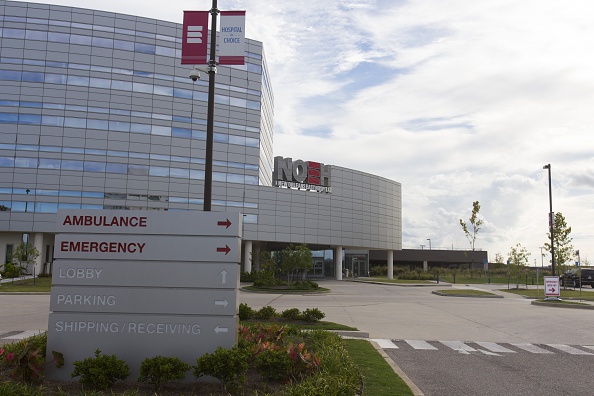
The rebuilt New Orleans East Hospital is seen in New Orleans on August 17, 2015. The hospital has rolled out a mobile testing unit and other programs to deal with the Covid-19 pandemic. Photo credit: Lee Celano/AFP via Getty Images
Nearly a decade after Hurricane Katrina, New Orleans East Hospital opened in 2014. It was the only hospital in to open in New Orleans East after several facilities closed in the devastation from the storm
The recovery since Katrina has been unequal. New Orleans East, once a bustling suburb, now is dotted with vacant buildings. Its residents face high poverty rates, limited access to grocery stores, and less access to well-paying jobs and educational opportunities.
“After the storm of 2005, there was an intentional lack of reinvestment in this area. … What that has left us with is an area of particularly concentrated disadvantage,” New Orleans East Hospital CEO Dr. Takeisha Davis said in a panel at MedCity INVEST Population Health. “We knew coming into this community, we didn’t just need to rebuild a hospital. We needed to build a community hub.”
Now, the coastal community faces another disaster: Covid-19. In all states, the coronavirus has disproportionately impacted Black and Latino patients. In Louisiana, the disparities are stark: 45% of Covid-19 deaths were in Black patients — significantly more than their representation in the population, according to data from the COVID Tracking Project.
In response, New Orleans East rolled out a mobile testing unit that could swab people for the coronavirus. They also saw an opportunity to use the mobile clinic provide other health services, including primary care visits, and blood pressure or blood sugar tests.
They could use it to reach schools that don’t have onsite health centers, or residents who face transportation challenges.

A Deep-dive Into Specialty Pharma
A specialty drug is a class of prescription medications used to treat complex, chronic or rare medical conditions. Although this classification was originally intended to define the treatment of rare, also termed “orphan” diseases, affecting fewer than 200,000 people in the US, more recently, specialty drugs have emerged as the cornerstone of treatment for chronic and complex diseases such as cancer, autoimmune conditions, diabetes, hepatitis C, and HIV/AIDS.
“We wanted to use the investment to tackle some of the social determinants of health that were underlying the disproportionate impact (of Covid-19),” Davis said.
With the pandemic casting more of a focus on healthcare disparities, she hopes policy changes will follow that help communities address these healthcare challenges. For example, restructuring how healthcare is paid for to incentivize preventive health services.
“I’m very hopeful that as they look at the Covid-19 response — we know that will be one of the first areas that President Biden and Vice President-elect Harris are looking at — that we will start to look at some of the disincentives that healthcare providers have around wellness and preventive care,” Davis said. “When they’re looking at transportation policies and education policies, that they’re thinking of the health implications there.”
For example, diabetes is the leading cause of death in Louisiana, and the community that New Orleans East serves has more than twice the state prevalence of Type 2 diabetes. The hospital opened a diabetes center that includes access to dieticians and nurse educators, as well as clinical care. It also began hosting a monthly farmer’s market.
Davis would like to see coverage not just for clinical services like blood sugar monitoring, but also covered visits with a nutritionist or cooking demonstrations.
Other policies not directly related to healthcare, such as transportation, can also have a big impact on people’s health.
For example, Conrod Kelly, Merck’s executive director of policy and government relations, said a lack of transportation or the inability to take time off from work can lead to reduced representation in clinical trials. In some cases, patients might need to come in for follow up visits or take medications that aren’t covered by the trial.
“It’s really easy to say, we made it available, we weren’t discriminating, we don’t understand why we can’t get representation,” he said. “There are these other systemic barriers that exist.”
He, too, was hopeful that the U.S. will see a bigger push toward health equity in the near future. With so much use of the term “essential workers,” he hopes it will spark discussions the around importance of healthcare access for people working in hospitals, grocery stores, distribution facilities and other often-overlooked roles.
“For maybe the first time, people understood the impact these underserved communities actually have on our economy,” he said. This appreciation and understanding that you’ve got a large percentage of our population who are essential to our economy, understanding that the reason why they’re at risk is because of these structural issues, I think that gives me a lot of hope that as a part of dealing with Covid, we’re going to have to confront that issue head on.”












